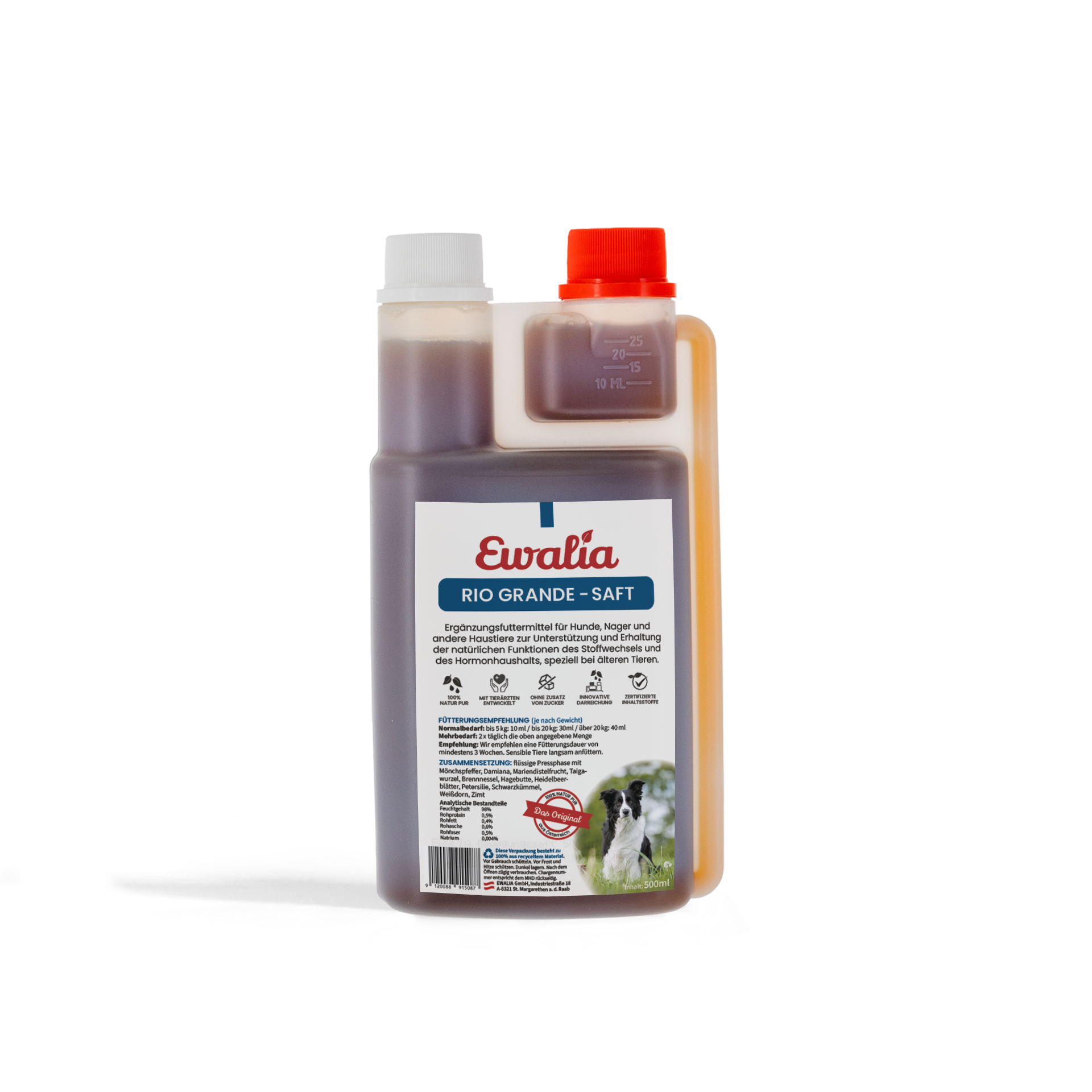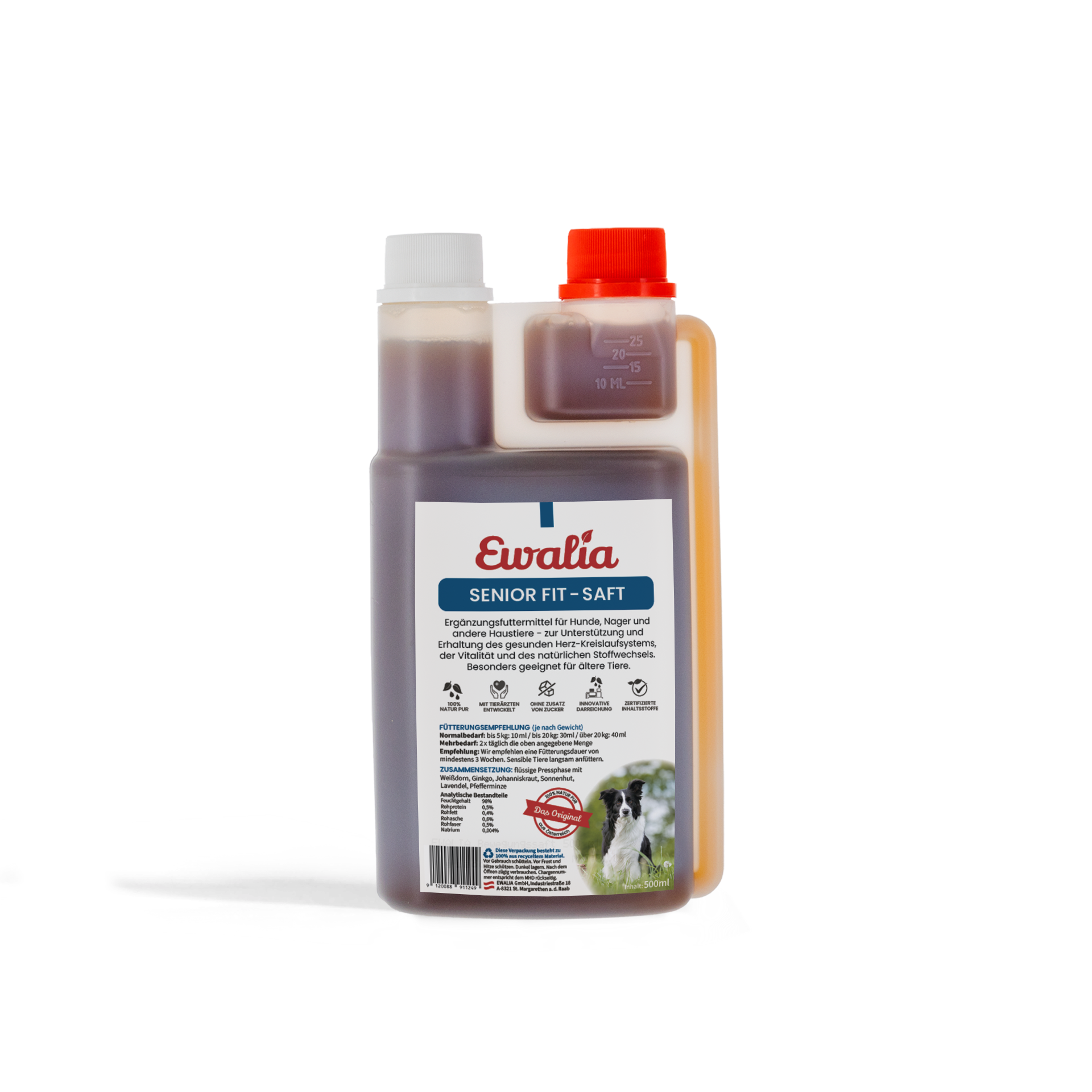Cushing's in dogs

Cushing's syndrome is one of the most commonly found disorders in dogs. It affects dogs aged 8 years and older. Symptoms usually develop over a period of months, leading dog owners to view them as part of the normal ageing process. If not caught in time, however, this disorder can have severe health consequences for afflicted dogs. Read here which signs point to Cushing's and how you can help your dog to have a better quality of life.
What is Cushing's syndrome?
Cushing's syndrome is a hormonal disorder in which a dog's adrenal cortex produces too much cortisol. A particular form, called Cushing's disease, is caused by a tumour in the pituitary gland, resulting in the overproduction of ACTH (adrenocorticotropic hormone), which stimulates the adrenal cortex. There are other causes for Cushing's syndrome, however, and it is therefore designated differently from Cushing's disease. The canine organism can no longer regulate the excess release of ACHT, resulting in a series of symptoms collectively known as Cushing's syndrome – not life threatening for the dog, but certainly unpleasant. Long-term Cushing's syndrome also increases the risk for more severe disorders like diabetes, pancreatitis, and kidney stones. This is why it's important that Cushing's be diagnosed and treated in a timely manner.
What is cortisol?
Cortisol is well-known as a stress hormone. Its job is to activate metabolic processes in stressful situations to temporarily provide more energy for the organism. At the same time it suppresses the immune system, a quality that makes it useful in medicine. Cortisol is also an important hormone for a dog's metabolism. It plays an important role in carbohydrate, fat, and protein metabolism, in the body's water and electrolyte balances, and in the immune system. It also stimulates the storage of sugar in the liver, supports the organism in high-stress situations, and protects the body from overload. This means that the level of cortisol in the body fluctuates considerably depending on situational factors. ATCH, which is produced in the pituitary gland and reaches the adrenal glands via the bloodstream, triggers cortisol production in the adrenal glands.
Healthy dogs experience higher cortisol secretions from increased exertion, for example during short-term strenuous activity, but also from stress. When this additional energy is no longer needed, the organism stops producing cortisol and the hormonal balance drops again. Disorders of the pituitary gland or the adrenal glands and the absorption of additional cortisol in the form of medications (cortisone) can derail cortisol production in the body. A constant excess of cortisol results in Cushing's disease, while a cortisol deficiency will trigger Addison's disease, which is life-threatening.
What are the signs of Cushing's syndrome?
Not all afflicted dogs have the same symptoms, but two or three of these common changes will occur simultaneously:
- greater thirst, increased drinking, and increased urine production. Some dogs produce so much urine that they can no longer "hold it in" and have accidents in the house. Other dogs lose urine whilst sleeping.
- Increased hunger, even cravings, leading to weight gain
- Increased panting, with preference for cold areas in which to lie
- Hair loss and lack of hair regrowth Typical areas for hair loss include the abdomen, back, flanks, tail, ears, and the backs of the hind legs. The coat becomes dull and thin, and the existing hair may even fall out. The paws and head are rarely affected.
- Thin, dry, "papery" skin, often with dark discolouration due to hyperpigmentation, particularly on the underbelly
- Congested sebaceous glands
- Festering skin inflammations
- Slow healing wounds
- Muscle atrophy
- Increased abdominal circumference (trunk fat), development of a drooping belly whilst the legs appear abnormally thin from lost muscle mass
- Failure to go into heat in female dogs
- Testicular atrophy in male dogs
- Neurological problems
- Increase susceptibility for infections due to weakened immune system
What types of dogs are prone to Cushing's syndrome?
Cushing's disease occurs frequently in the following breeds: dachshunds, poodles, terriers, cocker spaniels, beagles, German shepherds, boxers. Most dogs contract the disease in middle age, females more often than males.
Why do dogs get Cushing's disease?
There are two organic causes for Cushing's syndrome:
- in about 85% of cases, the cause is a tumour in the pituitary gland. This especially affects smaller dog breeds. This form of Cushing's is called pituitary-dependent hyperadrenocorticism. The tumour sends an excess of the transmitter ACTH via the bloodstream to the adrenal glands with the signal to produce cortisol. The overproduction of ACTH leads to an enlargement of the adrenal glands and to constant, increased cortisol secretion. The tumour itself is usually small and benign. Only in rare cases does it cause problems, which may be expressed in neurological abnormalities.
- Rarer still is a tumour in one of the adrenal glands, causing Cushing's disease. This tumour produces too much cortisol and causes typical Cushing's symptoms. This is known as adrenal-dependent hyperadrenocorticism. The adrenal gland affected by the tumour takes over complete hormone production whilst the other adrenal gland shrinks in size. The tumour in the adrenal gland may be benign or malignant.
Iatrogenic Cushing's syndrome occurs through cortisol in the form of medications that contain cortisone. Cortisone preparations, often sharply criticised, are now indispensable in veterinary medicine. They are important and often life-saving components of veterinary treatment! Unfortunately, they can also cause side effects, especially when taken over long periods, for example for allergies. Whether as injections, tablets or ointments, cortisone preparations will always have an effect on the entire organism. The tapering off and eventual discontinuation of cortisone treatments can reverse iatrogenic Cushing's syndrome.
How is Cushing's syndrome diagnosed?
When Cushing's is suspected, the vet will first order a blood and urine tests. Dogs with Cushing's often have extremely weak, watery urine due to their increased fluid intake. They may also suffer from bacterial urinary tract infections.
Blood counts show elevated liver enzymes and often high blood lipid levels. In addition, there may be a higher number of blood platelets and a tendency for thrombosis.
Ultrasound imaging of the abdominal region may show the adrenal glands to be enlarged or have tumours. An enlarged liver, which can also be determined through X-rays, also points to Cushing's.
A certain diagnosis of Cushing's disease can only be made through special hormone tests. The most common of these is the urinary cortisol:creatinine ratio test, where cortisol levels are measured in three independent morning urine samples from the dog. Other tests examine the reaction of the pituitary-adrenal system after receiving low doses of cortisone.
The tests are not easy to evaluate and may need to be repeated several times.
Important: If tests show no clear results, the dog may not be treated! If the cortisol level drops too sharply, it can lead to a life-threatening addisonian crisis, i.e. an adrenal insufficiency!
How is Cushing's treated?
Afflicted dogs are given a medication that inhibits the production of cortisol in the adrenal glands. This medication must be taken daily for the rest of the dog's life! The dosage must be tailored to each individual dog, i.e. the dosage is started at a rather low level and increased gradually. It may take several weeks until symptoms begin to clearly improve.
In the case of a tumour of the adrenal glands, the affected adrenal gland can sometimes be removed surgically. However, this is a complicated procedure and may only be carried out by specialists.
Dogs with Cushing's – frequent patients?
Regular veterinary monitoring is essential, especially in the stabilisation phase. The costs for treatment will depend on the medication dosage required and how many examinations are needed long-term. Higher costs must be expected for large dogs.
There is unfortunately no way around veterinary treatment if you want to spare your dog the unpleasant symptoms and consequences of Cushing's syndrome. You can support your dog's treatment and greatly improve its well-being with a balanced diet with the addition of herbs that bring the dog's hormones back into balance and take strain off the detoxifying organs.
Feeding your Cushing's dog
A dog with Cushing's disease should be fed regular meals several times a day so as not to overload the organism. Avoid raw foods, as these put strain on the already-loaded immune system. Homemade dog foods should be cooked!
Food for a Cushing's dog should:
- be low in energy and allowing for weight loss without causing loss of muscle mass or deficiencies. The dog' s ideal weight should be maintained long-term.
- be low in fat to take strain off the dog's liver
- contain easy-to-digest carbohydrates to limit insulin secretion
- avoid the formation of kidney stones: avoid organs, eggs, and vegetables containing oxalic acid (like spinach)!
- ensure a proper supply of minerals and trace elements!
- lean, high-protein meat like chicken and lean fish
- easy-to-digest carbohydrates like rice – other cereals are often less well tolerated
- small quantities of high-quality oils as supplements
Appropriate feeds for dogs with Cushing's
What about treats?
Having Cushing's doesn't mean the end of treats for your dog. However, always check the ingredients when buying treats. Treats should be low-fat and cereal-free products made from fruits or vegetables. Dogs will find such treats tasty as well.
Which herbs help dogs with Cushing's?
The hormone-regulating effects of chasteberry (Vitex agnus-castus L.) has been well-researched. Fruit extracts have been recognised as traditional herbal medicine by the HMPC (Herbal Medicinal Product Committee). The plant contains substances that affect the dopamine receptors in the pituitary gland, support stress regulation, and indirectly inhibit cortisol secretion.
Parsley (Petroselinum crispum) and damiana (Turnera diffusa) contain apigenin. Studies have shown that this substance can have positive effects on cortisol secretion in the body and reduce the accompanying symptoms of stress.
Cinnamon (Cinnamomum verum) lowered blood sugar levels in studies involving mice.
Siberian ginseng (Eleutherococcus senticosus) activates and maintains the body's natural defences, especially in the event of extraordinary bodily overloads like stress. Siberian ginseng is known to have adaptogenic, stimulating, and immunomodulatory properties.
Rose hips (Rosae fructus) are high in Vitamin C and support weakened immune systems.
Milk thistle fruits (Silybum marianum (L.) promote liver function and the regeneration of liver cells. Milk thistle is recognised as a traditional herbal medicine by the HMPC (Herbal Medicinal Product Committee), the ESCOP (European Scientific Cooperative on Phytotherapy) and the Commission E (the German government's scientific advisory board for herbal medicines).
Common nettle (Urtica dioica) is also a traditional herbal medicine and assists in the detoxification of the organism through its metabolism-promoting effects.
Can Cushing's syndrome be prevented?
Every dog owner should carefully monitor the health of their furry friend! Unusual symptoms and changes in behaviour may be signs of illness. Vets recommend that dogs over the age of six be brought in for annual blood and urine tests. Older dogs and those breeds with a higher risk of contracting Cushing's should have annual ultrasound scans as well.
Sources
- https://www.tieraerzteverlag.at/vetjournal/202003/cushing-syndrom
- https://www.med.vetmed.uni-muenchen.de/einrichtungen/innere_medizin/leistungen/endokrinologie/hyperadrenokorti.pdf
- Annette Liesegang: Fütterung bei Erkrankung der Nebennieren bei Hund, Katze und Pferd (=https://www.tierer.uzh.ch/12)
- https://arzneipflanzenlexikon.info/
- https://pubmed.ncbi.nlm.nih.gov/11948020/
- Wikipedia die freie Enzyklopädie















